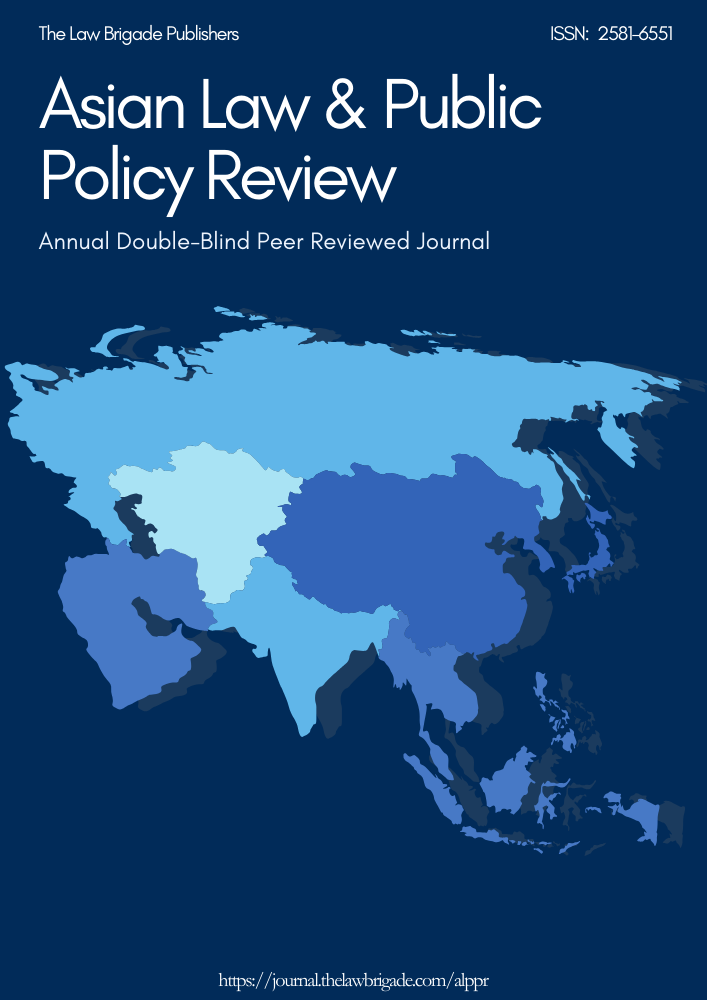An Analysis of the Capitalization Potency of ‘Value-Investment Opportunity’, arising from Global Recessionary Pressure through the Regulation of Outward Foreign Investment Policy by India with Comparative reference drawn to China
Keywords:
Foreign Investment Regulation, Indian Overseas Direct Investment Law, Global Policy, Geo-Politics, Regulatory ArbitrageAbstract
The People’s Republic of China utilizes the regulation of both it’s inward and outward foreign investment policy as it’s means of geo-political expansion. Outward Chinese Foreign Direct Investment, quite often implies the investment of capital by Chinese instruments of state (either directly or through the exercise of vicarious control), into private and public foreign enterprises, definitive of critical infrastructure for the recipient state (i.e., the ‘Compana General De Electricidad’ of Chile, being the Chilean electricity grid, acquired by China State Grid). The Chinese state finances such geo-political expansion, also through the practice of inward FDI policy regulation (incentivizing domestic manufacturing by foreign and local enterprises, contingent upon export assurance), with the advancement of neo-mercantilism and state control- generating a balance of payments surplus (available to the discretionary use of the state).China has been, and will therefore be, well positioned to capitalize upon the widespread ‘value-investment opportunity’ arising from the market value depreciation of enterprises, devoid of intrinsic value fluctuation, in the light of global recessionary pressure (as exemplified by Chinese investment during COVID-19).
India on the contrary has experienced the augmentation of disparity between outward and inward foreign direct investment, with the former, exceeding the latter by 6.3 times as of 2022, according to the reserve bank of India. As there is a clear demarcation between private and instrument of state derived outward foreign investment, in the context of India, due to democratic impetus (translating to codification), restraining significant vicarious state control of the private sector; India’s prospective capitalization of the recession-induced ‘value investment opportunity’, may not imply concurrent geo-political expansion.
India’s capitalization potential, is therefore at a relatively nascent stage, in comparison to China, however the objective of this essay is to highlight how the strategic regulation of India’s outward FDI policy, entailing outward FDI augmentation and imposition of the contingent requisite of national interest alignment/adherence, in conjunction with India’s inward FDI policy, fostering a model emblematic of neo-mercantilism with export incentivization/assurance-imposition, may catalyse India’s attainment of geo-political prominence.
Downloads
References
i World Bank Group (2022) Risk of global recession in 2023 rises amid simultaneous rate hikes, World Bank,
World Bank. Available at: https://www.worldbank.org/en/news/press-release/2022/09/15/risk-ofglobal-recession-in-2023-rises-amid-simultaneous-rate-hikes (Accessed: 27 July 2023).
ii Plummer, S. (2023) Why is the stock market down, and why is it crashing? (2023), The Annuity Expert.
(Accessed: 27 July 2023).
iii Rotblut, C. (2023) Ideas from Benjamin Graham, the father of value investing, Forbes. Available at:
https://www.forbes.com/sites/investor/2023/03/15/ideas-from-benjamin-graham-the-father-of-valueinvesting/?sh=48d5d9fa2ec3 (Accessed: 27 July 2023).
iv FEM (OI) Rules, 2022, Rule 2 (1) (q).
v FDI Consolidated Policy Circular 2020, DPIIT, ¶2.1.16.
vi FEM (OI) Rules, 2022 (M.O.F).
vii FEM (OI) Regulations, 2022 (RBI).
viii FEM (OI) Rules, 2022, Rule 3.
ix FEM (OI) Rules, 2022, Rule 2 (1) (q).
x FEM (OI) Rules, 2022, Rule 2 (1) (s).
xi FEM (OI) Rules, 2022, Rule 19 (1) (a).
xii FEM (OI) Rules, 2022, Rule 19 (3).
xiii E.P Royappa v. State of Tamil Nadu, (1974) 4 SCC 3.
Downloads
Published
Issue
Section
License

This work is licensed under a Creative Commons Attribution-NonCommercial-ShareAlike 4.0 International License.
License Terms
Ownership and Licensing:
Authors of research papers submitted to any journal published by The Law Brigade Publishers retain the copyright of their work while granting the journal specific rights. Authors maintain ownership of the copyright and grant the journal the right of first publication. Simultaneously, authors agree to license their research papers under the Creative Commons Attribution-ShareAlike 4.0 International (CC BY-SA 4.0) License.
License Permissions:
Under the CC BY-SA 4.0 License, others are permitted to share and adapt the work, even for commercial purposes, provided that appropriate attribution is given to the authors, and acknowledgment is made of the initial publication by The Law Brigade Publishers. This license encourages the broad dissemination and reuse of research papers while ensuring that the original work is properly credited.
Additional Distribution Arrangements:
Authors are free to enter into separate, non-exclusive contractual arrangements for distributing the published version of the work (e.g., posting it to institutional repositories or publishing it in books), provided that the original publication by The Law Brigade Publishers is acknowledged.
Online Posting:
Authors are encouraged to share their work online (e.g., in institutional repositories or on personal websites) both prior to submission and after publication. This practice can facilitate productive exchanges and increase the visibility and citation of the work.
Responsibility and Liability:
Authors are responsible for ensuring that their submitted research papers do not infringe on the copyright, privacy, or other rights of third parties. The Law Brigade Publishers disclaims any liability for any copyright infringement or violation of third-party rights within the submitted research papers.


